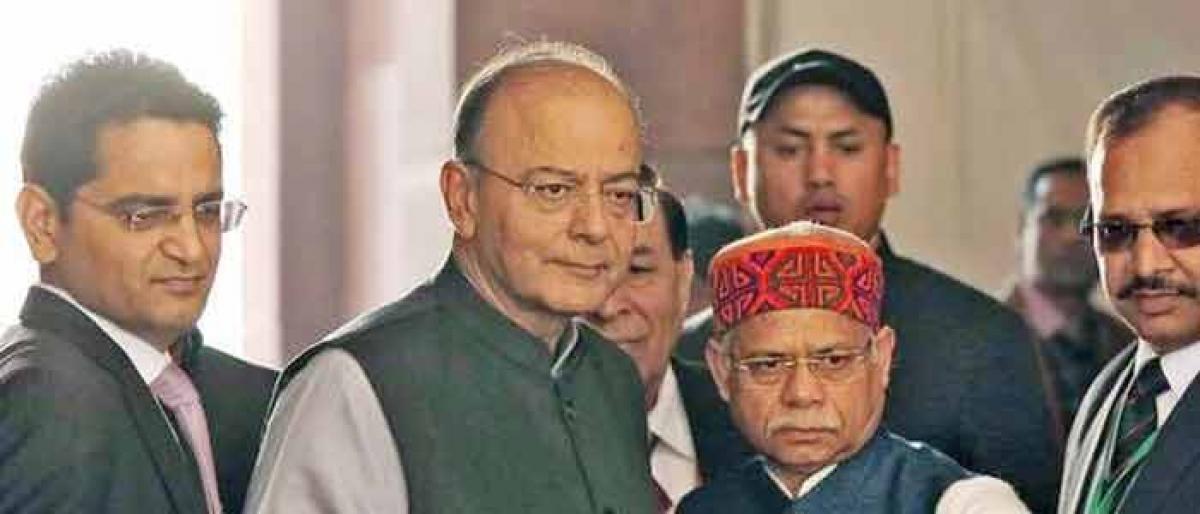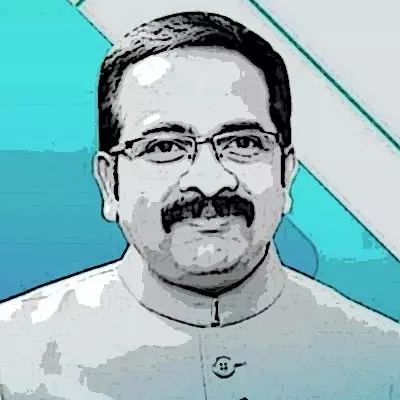Live
- UP bypolls: NDA leads in early trends, SP trails behind
- MVA stunned as MahaYuti heads to landslide win in Maharashtra polls
- Trends in Maha and J'khand a reflection of 'Modi magic': BJP
- Karnataka bypolls: Cong leading, celebrations in Channapatna; BJP concedes defeat in Sandur
- India-EFTA trade pact to drive $100 bn investment, boost 99.6 pc of exports
- Karnataka bypolls: Cong leading in all 3 segments, Kumaraswamy’s son trails by 18,029 votes
- MahaYuti bounces back in Vidarbha after dismal show in Lok Sabha polls
- Priyanka Gandhi will win with huge margin, says Telangana CM Revanth Reddy
- Three paramedics killed in Israeli airstrike on Lebanon
- 321 arrested in Tunisia for drug trafficking, criminal offences
Just In

The Union Budget 2018-19 proposals were tabled in the parliament a few days ago. It is an annual ritual which projects revenues and expenses of the central government for the year ahead.
The Union Budget 2018-19 proposals were tabled in the parliament a few days ago. It is an annual ritual which projects revenues and expenses of the central government for the year ahead. However, the politics of obfuscation is so prevalent in India that everything falls under the gambit of politics. The Union Budget, too, is no exception. There has been a plenty of politics in the entire week on the Union Budget, especially in the Telugu-speaking states of Telangana and Andhra Pradesh.
The Union Budget in any quasi-federal or federal republic has very less to do with States’ Budget. Only in unitary nations does the Union Budget make State-specific allocations. However, the colonial legacy of India had a unitary state system under the British Empire, and even 70 years after they left our shores, our budgetary procedure, presentation and allocations still reflect the colonial practices of a unitary nation.
Congress party which ruled this nation immediately after independence and for around 60 years did nothing to change those colonial practices to redesign the budgetary process to fit our own national system. It’s not ignorance but selfish political expediency that drove Congress party to continue the British legacy in many areas of governance even till date.
No wonder, the State governments across India have been habituated to expect sops, doles, freebies, reliefs and special allocations every time the central government presents its annual budget. The latest political storm in Andhra Pradesh and the massive political blame game is driven out of the same chronic, confused and misplaced expectations from the Union Budget.
Congress party has successfully made a circus out of Union Budget during decades of its misgovernance. It has set a wrong and anti-systemic precedence which defeats the very purpose, essence and spirit of a federal republic.
All States in India have constitutional freedoms to craft their own budgets, provide for their own expenditure and revenue to develop their states according to their specific governance plan, with an exception of States like J&K and those in North East which have geographic, topographic, demographic and other resource barriers for driving their states towards self-sufficiency and development. All the other states in India have equal opportunity to plan and execute governance and growth agendas on their own.
In a federal republic, the central government role is to primarily protect national sovereignty, integrity, peace and tranquility, and through its national policies and schemes drive inclusive growth, equitable development and level playing field for all the States.
The Indian Constitution provides through State List and Concurrent List full control to States on many governance areas to explore, exploit and nurture resources and independently govern states without the central government intervention. However, a few state governments which exercise their rights through these constitutional lists tend not to exercise their responsibilities with the same fervor, and conveniently blame the Centre for their own fiscal indiscipline and misgovernance.
The Union Budget makes budgetary allocations to its ministries only after sharing the rightful State devolution from the total tax collection. Modi government has increased the State devolution from 32% to 42% since its inception in 2014 to ensure State governments have more funds at their disposal for designing their annual budgetary plans.
State governments can independently grow and flourish despite Central government support. Their reliance on Central government has to be bare-minimal – that’s the spirit of a federal republic. It’s about independent governance of states. There are many classic examples of highly successful state governments who were unduly and politically targeted by ruling parties of the Central government in the past and yet rose despite very less support from the central government. Gujarat, Madhya Pradesh, Chhattisgarh, Punjab, Tamil Nadu are a few good examples.
However, it’s unethical and uncouth for any ruling party to target opposition party-ruled state governments politically to suppress their growth. Through cooperative federalism and through the spirit of Team India, PM Narendra Modi has throughout this term of the central government tried to ensure all states get level playing field and succeed together. Those who cannot play cannot blame the central government.
India still being a welfare state with over 25% of its population below the poverty line, the central government has a large role to provide for welfare of the poor and needy in India. Central Budget still provides a massive percentage of its funds to welfare and development of the underprivileged and the needy. All these welfare and development funds are routed through the state governments as national schemes. As a bad practice, many states divert these funds from social welfare towards their pet state projects and don’t even recognise central government fund contribution towards welfare and development of the poor.
The misplaced legacy of Central Budget needs to change and change radically, not gradually. India needs to streamline its funds flow and make every single touch point accountable for its spending. Lack of accountability and institutionalised corruption across the system have wasted billions of fund allocations for the uplift of poor. No wonder the alleviation of poverty still remains an unfulfilled dream even after 70 years of independence.
State governments and their heads are taking cover under constitutionally provided guarantees and freedoms to exploit and misuse the administrative control they are given, to spend hard-earned tax payer’s money. As long as the system is not foolproof to protect these national funds, there are always people who have quick fingers to loot.
It is important especially for young Indians to understand that expecting sops, doles, freebies, reliefs and special packages from Central Budget is an old mindset and a hugely misplaced legacy of the colonial past. Central Budget is for equipping the national ministries to function smoothly to serve national objectives and for macro allocations for the welfare of poor and needy across the nation.
State governments need to plan their own budgets realistically, transparently and sincerely to ensure funds which they earn through their revenues, devolution funds, grants, national scheme funds and from other sources are allocated and spent accountably for the welfare, development and overall growth of their respective states. All allegations of injustice, hue and cry over Union Budget are politically motivated, baseless and unfounded.Union Budget of a federal republic like India is not States Budget.

© 2024 Hyderabad Media House Limited/The Hans India. All rights reserved. Powered by hocalwire.com







